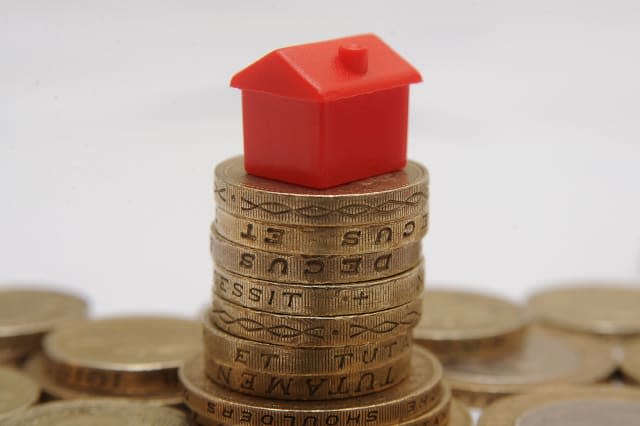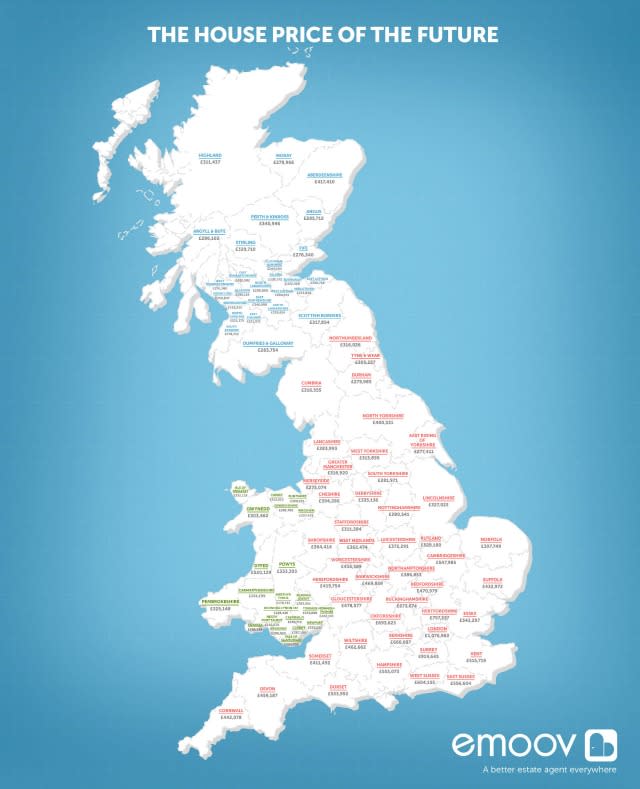How much will your home be worth in 2030? New map reveals all

A new map has revealed the eye-watering state of the UK housing market by 2030 - and just how much the value of property could rise. It has been put together by fixed fee estate agency eMoov - assuming that house prices continue on the path they have taken so far in the 21st century. The conclusions it has drawn are astonishing.
Over the first 15 years of this century, house prices rose 84%, and if this was to happen again over the following 15 years, the average house price will be £450,000 by 2030.
This masks enormous regional differences, so in some areas house price rises will be even more striking. In England the average will be almost £460,000, while in Wales it will be closer to £310,000 and in Scotland around £300,000.
Some areas will be alarmingly pricey. In London, for example, the average house will set you back £1 million by this stage, while in the priciest part of the capital (Kensington and Chelsea) the average price would rise from £1.9 million to £3.4 million.
Other than London, 12 counties across England will also be home to an average house price over £500,000. Property across Dorset, East and West Sussex, Kent, Essex, Berkshire, Surrey, Oxfordshire, Hertfordshire, Buckinghamshire, Cambridgeshire and Rutland will all command more than half a million pounds on average.
The only areas of England that will offer an average house price under £280,000 will be Merseyside (£275,074), East Riding of Yorkshire (£277,411) and Durham (£279,985).
(Story continues below)
On the surface, homeowners may be cheered by the rising value of their home, as it makes us feel we have made an excellent buying decision, it boosts the equity we have in our home, and it adds to our wealth.
Unaffordable
However, for anyone who ever plans to move up the housing ladder, any price movement makes this harder. Likewise, anyone yet to get a foot on the ladder is watching their chances of home ownership go up in smoke. Even if you are a homeowner with no intention of trading up, there's always the worry of how much help children and grandchildren will need to get onto the property ladder.
Russell Quirk, of eMoov, says: "This map highlights just how dangerous this current artificial inflation of the market could be in the long run, it's not just London that will become beyond the reach of the average UK homebuyer, the issue will spread the length and breadth of England, Scotland and Wales."
Then there is the fact that the more that house prices rise out of control, the more the risk rises that the property bubble will burst. The last 15 years has shown us the dangers of rampant house price rises, and nobody wants to go through that again.
What's even more worrying is that this isn't the only study of this kind that is predicting enormous house price rises. Back in February, Santander (in a report compiled by LSE professor Paul Cheshire) suggested that by 2030, the average house will cost £560,000.
Don't panic
The good news is that there's a reasonable chance this will not come to pass. Investment professionals will always tell you that past performance is no guide to the future, and house prices are a classic example of this. In terms of recent growth, these aren't outlandish figures, but you have to consider where we stand right now.
Houses have never been so expensive - and they have only been more expensive in terms of affordability once - at the peak of the boom in the 2000s. For there to be even more growth on top of this, we will need demand from buyers who can afford these high prices - and it's hard to see where they will come from.
Mortgage lenders don't have the same kind of freedom to lend enormous sums, and families are already having to stretch their finances alarmingly to get their children on the property ladder - there is a limit to how much the Bank of Mum and Dad is going to be willing to lend too.
Even if buyers can find someone to lend to them, they have to be able to afford the mortgage. The Resolution think tank has pointed out that lower and middle income houses are spending 26% of their salaries on housing - compared to 18% in 1995. In London that rises to 28%.
People will simply not be able to afford much higher mortgages unless they get a substantial pay rise - and that's not on the cards. Then, of course, there's the very real prospect of rising interest rates during the next 15 years - which is going to make mortgages even more expensive.
But what do you think? Is this map right, and will house prices continue to run wild? Let us know in the comments.





